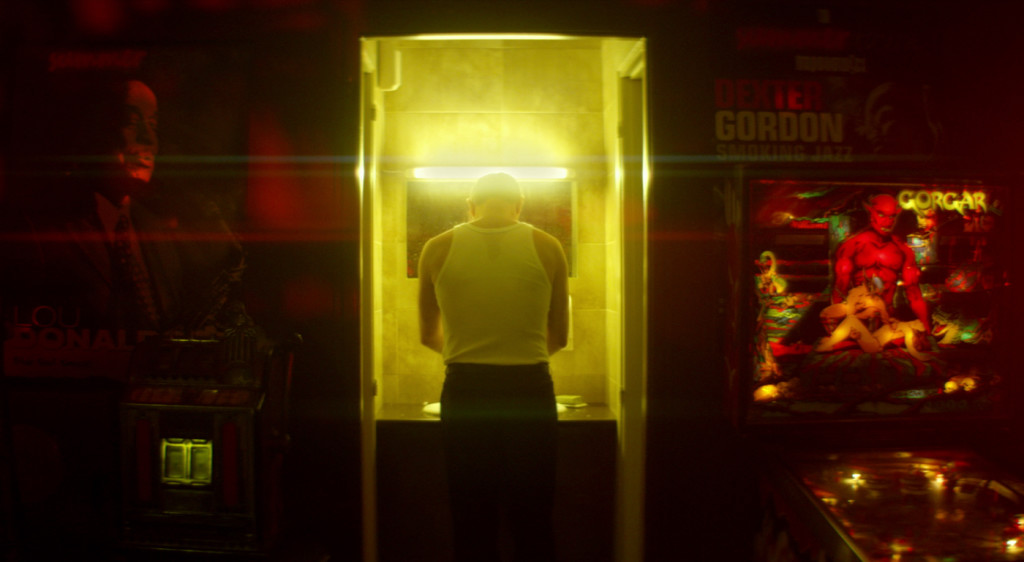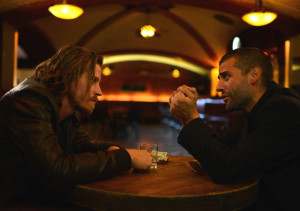By Gary M. Kramer.
This year’s Tribeca Film Festival provided a showcase for a pair of fascinating documentaries and a quartet of intriguing genre films. Here are reviews for a half-dozen films from the fest.
Uncertain, which earned directors Anna Sandilands and Ewan McNichol the Albert Maysles New Documentary Director Award at the festival, is a striking portrait of a handful of residents from the titular Texas town. Uncertain is a place where one lawman says, “You need to be lost to find it.” There are even amusing signs such as “Uncertain Town Hall,” and “The Church of Uncertain,” to show the town’s sense of self. The three individuals featured in the film are all at critical stages in their lives. Zach is a young man with diabetes who feels stuck in the town, and hopes to leave for Austin; Henry is an elderly fisherman, regretful of mistakes in his past, but happy with his new girlfriend Mary; and Wayne is an ex-con, in recovery determined to kill a wild boar he named “Mr. Ed.” Meanwhile, an aquatic weed, salvinia, is choking the town’s lake and killing off the fish; the only way to combat it is weevils. Uncertain makes the stories (past and present) of each of these protagonists—the weed is a character itself—come alive through interviews and observational footage. Unlike the salvinia, the men try to fend off death and being choked by poverty, addiction, and other life threatening conditions in Uncertain. Sandilands and McNichol make the heat in Uncertain palpable, and the gorgeous cinematography—Henry gliding along the mangrove-lined lake, or Wayne lurking at night in the woods hunting boar—provides a you-are-there quality. The idiosyncratic voices and stunning visuals help viewers understand and appreciate the quotidian lives on display.
The opening moments of Ido Mizrahy’s documentary GORED, are seen from the center of the bullring as Antonio Barrera prepares for his last fight. He will either die in the ring, or retire. The film generates some of its suspense as this plot plays out, but much of the film provides Barrera’s backstory. Scenes of his wife expressing her anxiety are contrasted with tense moments of her and her daughter silently watching with obvious unease as Antonio get dressed for a fight. Likewise, scenes of Antonio practicing and praying show his preparation and worry. GORED shows how Barrera become involved in the gruesome sport and why he is dedicated to it despite holding the record for being gored more than any other fighter. Watching him “come back from the dead” (on more than one occasion) is inspiring, but the film is a bit flat in showing the art of bullfighting. Instead montages of Barrera being gored are seen to make points, and in many cases, this footage is difficult to watch. GORED wants to be both respectful of the sport and questioning about why people put themselves through such brave torture, and as a result, it seems to be a compromised effort.
The atmospheric sci-fi film, Jackrabbit, opens with a series of distinctive sounds—high pitched frequencies and sirens—as if to acclimate viewers to the future, when the film takes place. It is 25 years after “The Reset,” when society was left with nothing and humans have to “rebuild the future.” As such, there are no stars in the sky, a curfew is in effect, and it is unhealthy to be outside more than one hour a day. Technology is being used to maintain stability and sustain humanity. This is when the story kicks in. Eric (Ryan Dailey) has committed suicide. His friend Simon (Josh Caras) takes a quality control job at Vopo, a firm dedicated to security. When Simon is contacted by Max (Ian Christopher Noel), a hacker, the pair tries to figure out coded messages and a way of escaping from society. They eventually connect with Grace (Joslyn Jensen). Jackrabbit addresses the issues of human contact in a tech-laden society but the film’s too cool approach fails to engender much emotional involvement with the characters. The interesting social elements need a sharper focus. To his credit, director/co-writer Carleton Ranney (making his feature debut) does much with his limited budget and weaves the drama, surveillance footage, and technological elements together well. He also coaxes a terrific turn from Ian Christopher Noel as Max. Jackrabbit gains some steam as it builds to its climax but overall, it lacks power.
Mojave is the second film directed by William Monahan, who won an Oscar for his screenplay for The Departed (2006). The filmmaker also penned the too clever by half script, a cross between Hollywood satire and existential thriller. Thomas (Garrett Hedlund) is an actor having a crisis of conscience. He heads out to the eponymous desert and encounters a drifter, Jack (Oscar Isaac). The pair scuffle, and shortly thereafter, a man is killed. Thomas tries to cover up the crime, but Jack knows the truth and is in hot pursuit. Mojave soon returns to Los Angeles, where it introduces characters ranging from Thomas’ agent (Walton Goggins, in Jack Nicholson mode) to his producer (Mark Wahlberg, who spends most of his screen time in a bathrobe). The film, however, fails to catch because the incident that predicated the disagreement between the two main characters is unsatisfying (if not downright unclear). Mojave never makes Thomas sympathetic or heroic, and viewers will likely want Jack to best him, in part because Isaac chewing the scenery is more enjoyable than Hedlund’s uninspired performance. Monahan fails to provide any suspense in his pacing, letting scenes unfold in a enervating manner. When Jack is being mischievous—stealing a stranger’s identity and takes over his fancy house—Mojave holds interest. But mostly, Monahan squanders his premise and his promise.
Wednesday 04:45 boasts a knockout shootout in the rain, filmed in glorious slow-motion; a sequence that occurs on the time and day of the title. The scene is so well executed one wishes that the rest of writer/director Alexis Alexiou’s slow-burn drama, set in 2010 Athens, was as gripping. The dazzling photography of this sepia-toned thriller amounts to little more than putting lipstick on a pig. Wednesday 04:45 has Stelios (Stelios Mainas), a jazz café owner, in debt to The Romanian (Mimi Branescu of Tuesday, After Christmas). He tries to rustle up the large sum of money owed by visiting various acquaintances and family members, and tangling with Omer (Giorgos Symeonidis), who has his own troubles. The tedious film lumbers from tiresome episode to episode, introducing heavy-handed symbols such as nosebleeds and untied shoelaces, and metaphors about the Greek economic crisis. There are also aphorisms about only the useless and the hungry survive. While the noir qualities of the film are agreeable, the paper-thin characters and lack of dramatic tension prevent Wednesday 04:45 from being particularly compelling.
Hyena, from British writer/director Gerard Johnson, is a stylish, seedy cop flick. Michael Logan (Peter Ferdinando) is a corrupt police officer who takes drugs, not because he is deep under cover with the Turkish gang with whom he is involved, but so he can get through his tough days. When his contact is violently murdered, Michael seeks out the Albanians who did it. What he discovers is that the killers are trafficking in women, such as Ariana (Elisa Lasowski), whom Michael helps rescue. Hyena does not skimp when it depicts the more lurid elements of its story. Johnson rubs the audience’s eyes and noses in unpleasantness, from a graphic sex scene—Ariana is drugged and raped—to violent dismemberment. The soundtrack, by the band The The, creates a dreamy soundscape for one hypnotic sequence in a nightclub, and later provides a throbbing, heartbeat-like pulse to give energy to a scene in which Michael does some detecting. If Johnson’s film is uneven—with an underdeveloped subplot involving Michael being investigated or possibly set up by internal affairs—the flinty performance by Ferdinando carries this gritty film over its rough spots.
Gary M. Kramer is the author of Independent Queer Cinema: Reviews and Interviews, and co-editor of the recently published Directory of World Cinema: Argentina.




